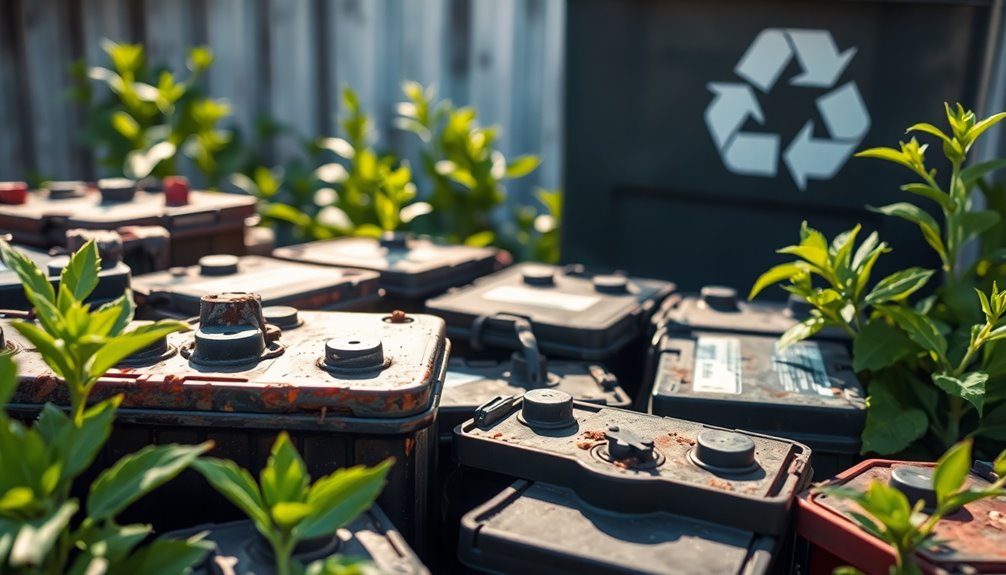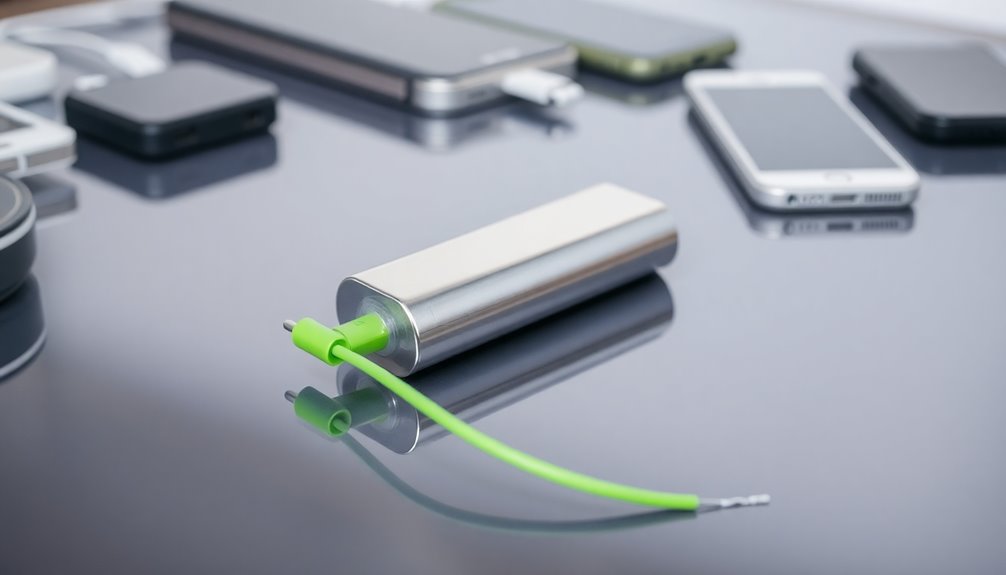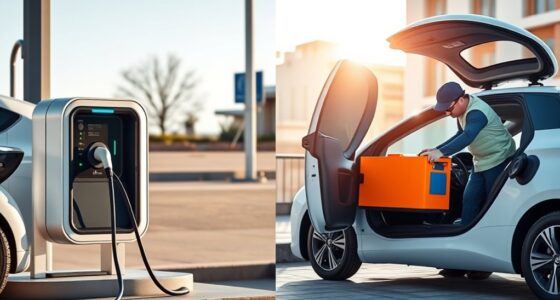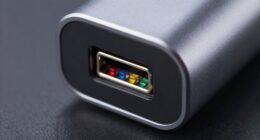When you've got an old car battery, don't just toss it in the trash. Instead, take it to a local recycling center or retailer like Walmart or AutoZone, which safely handle used batteries. Always wear protective gear when handling batteries and store them upright in a cool place. If you find one leaking, contact hazardous waste services right away. Recycling keeps harmful materials like lead and sulfuric acid out of the environment. You'll also help recover valuable resources. For more insights on sustainable options and community initiatives, there's plenty more that can enhance your eco-friendly efforts!
Key Takeaways
- Locate a Recycling Center: Use apps like Recycle Coach to find local battery recycling centers or retailers that accept old car batteries.
- Safe Handling: Wear protective gloves and glasses when handling batteries to prevent exposure to hazardous materials.
- Store Properly: Keep old batteries upright in a cool, dry place and secure terminals with non-conductive tape to avoid leaks.
- Contact Professionals: For damaged or leaking batteries, reach out to hazardous waste services for safe disposal and recycling options.
- Consider Cash Incentives: Many retailers offer cash incentives for returning old batteries, making recycling both eco-friendly and financially beneficial.
Importance of Recycling Car Batteries

Recycling car batteries is essential for several reasons that directly impact both the environment and public health.
When you engage in battery recycling, you help reduce the environmental impact of improper disposal of car batteries, which can contaminate soil and water with hazardous materials like lead and sulfuric acid.
Over 95% of lead-acid battery materials are recyclable, meaning you're not just preventing pollution but also recovering valuable materials.
By choosing eco-friendly disposal methods, you contribute to a circular economy, minimizing the need for new raw materials.
Unfortunately, nearly 1 million lead batteries in the U.S. go unrecycled each year, underscoring the importance of educating yourself and others about proper disposal methods to mitigate these risks.
Car Battery Recycling Process
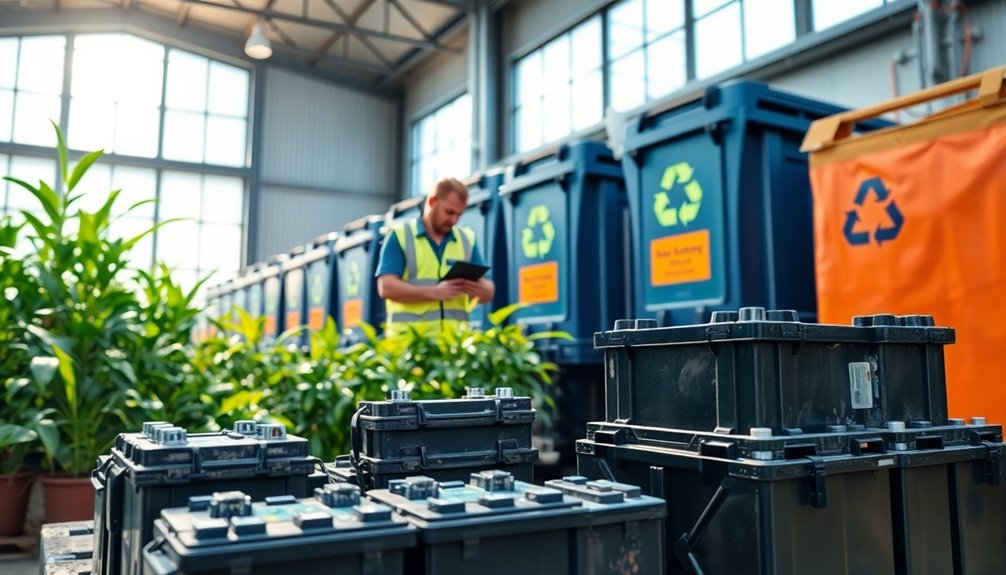
When you dispose of a car battery, understanding the recycling process can make a significant difference in reducing environmental harm. The battery recycling process starts with collecting used batteries from garages or retailers, ensuring safety protocols are followed. At recycling facilities, batteries get crushed, and ferrous metals are removed. The hazardous sulfuric acid is neutralized into treated water, while other materials are sorted for recycling into new products. Up to 99% of lead-acid batteries' components can be recycled, minimizing environmental impact.
| Step | Action Taken | Environmental Benefit |
|---|---|---|
| Collection | Gather used batteries | Safe disposal of hazardous materials |
| Crushing | Batteries are crushed | Easier sorting and recycling |
| Acid Neutralization | Convert acid to treated water | Prevents soil and water contamination |
| Material Separation | Sort remaining materials | Maximizes resource recovery |
| Recycling | Create new products | Promotes sustainability |
Finding Recycling Locations
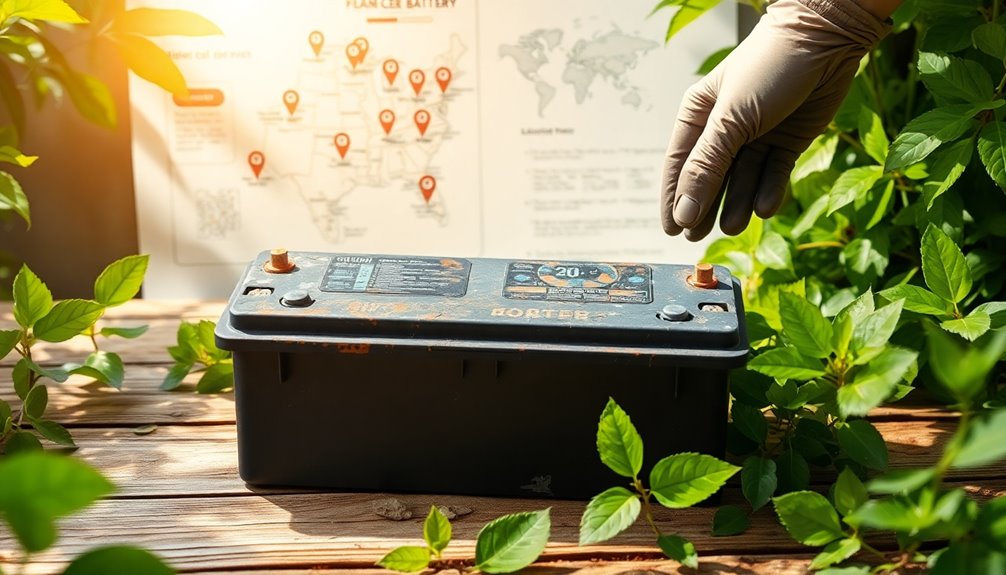
When you need to recycle your old car battery, it's easy to find the right spot.
Many local collection centers and major retailers like Walmart and AutoZone accept batteries for recycling.
You can also use online tools like the Recycle Coach app to pinpoint nearby options and their specific guidelines.
Local Collection Centers
Finding the right local collection centers for your old car battery can make the recycling process effortless and responsible.
Many auto parts stores, like Walmart and AutoZone, accept batteries for recycling and may even offer cash incentives based on the battery's condition.
Local recycling centers and hazardous waste facilities specialize in safe disposal, so it's essential to confirm they accept batteries before visiting.
Check with your municipality for battery recycling programs, as they often provide collection locations on community websites.
You can also use the Recycle Coach app to locate nearby collection centers and stay informed about local recycling guidelines.
Retailer Drop-Off Options
If you're looking to recycle your old car battery conveniently, many large retailers, like Walmart and AutoZone, provide easy drop-off options.
These retailer drop-off options make responsible disposal a breeze. Before you head out, check their acceptance policies and see if they offer cash for your used battery. Local auto shops often participate as well.
Here are some tips to guarantee a smooth recycling experience:
- Confirm the battery's condition for potential cash value.
- Look for certified recycling centers to comply with environmental regulations.
- Explore community hazardous waste programs for additional recycling avenues.
- Always handle batteries carefully to avoid health risks.
Online Resource Tools
How can you easily locate a recycling center for your old car battery? Luckily, there are several online resources at your fingertips. You can use the Recycle Coach app to find local recycling centers and check collection schedules. Websites like Earth911.com allow you to search for certified recycling facilities based on your location. Many auto retailers, like Walmart and AutoZone, also provide online tools to pinpoint their battery disposal drop-off spots. Additionally, local waste management agencies often publish guides for safe battery disposal, and community recycling programs offer educational materials on eco-friendly ways to dispose of batteries.
| Resource | Description |
|---|---|
| Recycle Coach | Find local recycling centers |
| Earth911.com | Search certified recycling facilities |
| Auto Retailers | Locate battery disposal points |
| Community Programs | Access educational materials on disposal |
Safe Handling of Batteries
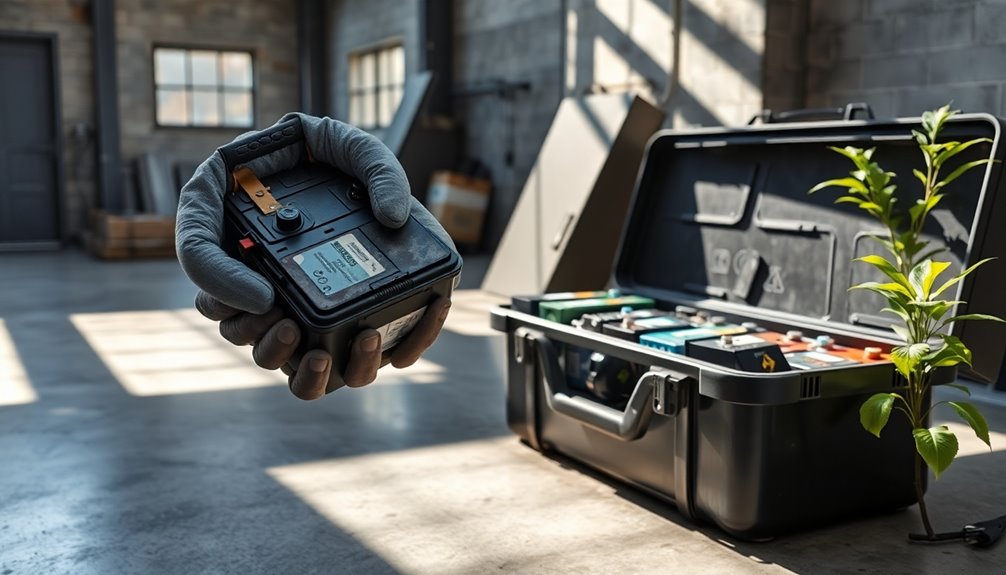
When handling old car batteries, it's vital to prioritize safety to avoid exposure to harmful substances like lead and sulfuric acid. Here are some safe handling tips to keep in mind:
- Always wear protective gloves and safety glasses to shield yourself from harmful chemicals.
- Store batteries upright in a cool, dry place to prevent leaks that could create environmental hazards.
- Secure battery terminals with non-conductive tape during transport to prevent accidental sparks.
- Use plastic containers or trays to catch any potential leaks, especially if dealing with damaged batteries.
If you encounter a leaking or damaged battery, contact hazardous waste services for professional handling.
Proper precautions are important to protect your health and the environment when dealing with these hazardous waste materials.
Community Recycling Initiatives
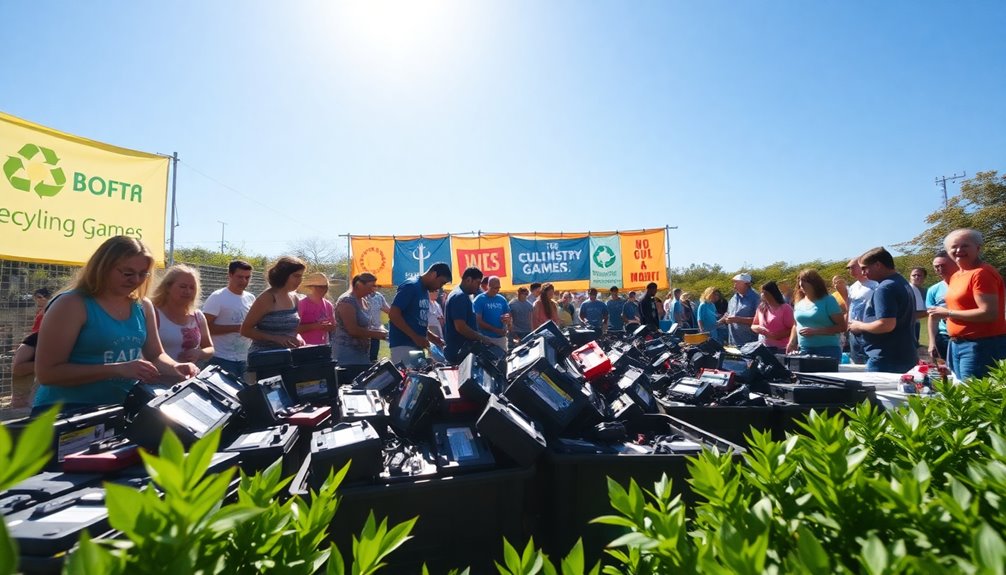
As communities recognize the importance of responsible battery disposal, many are launching recycling initiatives that provide safe and accessible options for residents.
Local hazardous waste collection programs are a great way to guarantee proper battery disposal, minimizing environmental risks.
Municipalities often partner with organizations like Recycle Coach to enhance these community recycling initiatives and raise awareness about recycling programs.
Educational campaigns make a significant impact, encouraging more people to participate and increasing the recovery rate of recyclable materials.
You can also support sustainable practices by collaborating with local businesses to create battery drop-off points.
Engaging schools and universities in recycling education fosters a culture of sustainability, empowering younger generations to prioritize eco-friendly disposal methods for batteries.
Environmental Impact of Improper Disposal
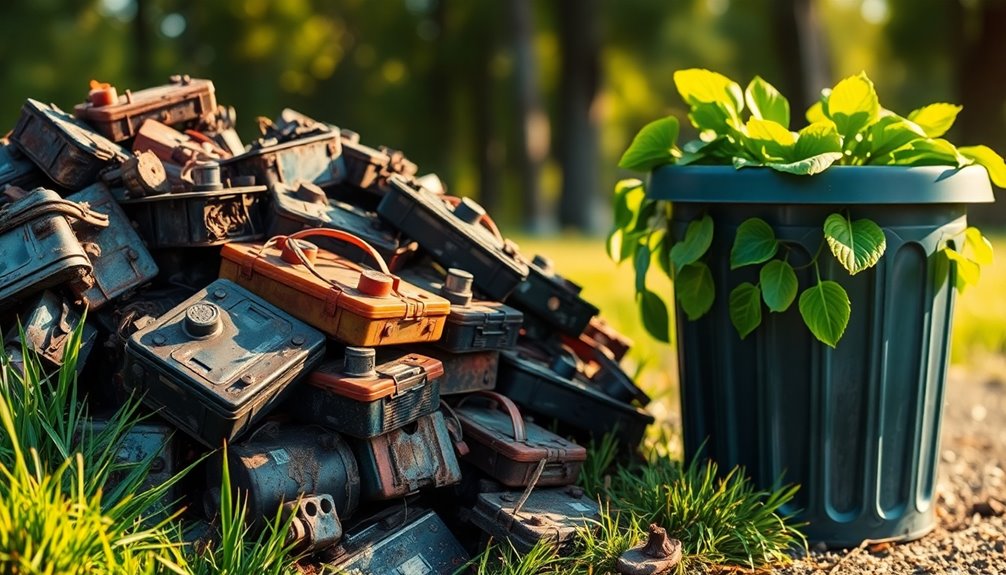
Improperly disposing of old car batteries can seriously harm the environment.
Hazardous materials like lead and sulfuric acid can seep into the soil and contaminate groundwater, affecting both ecosystems and drinking water.
It's essential to recognize the impact of these actions and take steps to recycle batteries properly.
Soil Contamination Risks
Improper disposal of old car batteries poses serious risks to soil health, as harmful substances like lead and sulfuric acid can leach into the ground.
When you dispose of car batteries incorrectly, you increase your environmental footprint and compromise local ecosystems.
Consider the following risks of soil contamination:
- Lead can contaminate over 20 acres, according to the EPA.
- Contaminated soil can reduce agricultural productivity.
- Toxins can accumulate in crops, entering the food chain.
- Long-term exposure to lead can cause severe health issues, especially in children.
Prioritizing proper battery recycling practices is essential for environmental protection.
Water Pollution Consequences
When old car batteries are discarded carelessly, they can release toxic substances like lead and sulfuric acid into our water systems, leading to dire consequences for the environment and human health.
This hazardous pollution can contaminate drinking water supplies, resulting in serious health issues, particularly for children, who are more vulnerable to neurological damage and developmental problems.
With nearly 1 million batteries going unrecycled each year in the U.S., the risk of environmental damage increases greatly.
Lead from improperly disposed batteries can bioaccumulate in aquatic organisms, disrupting entire food chains.
To combat this pollution, it's essential to prioritize proper disposal and recycling of batteries, helping protect our water sources and ecosystems from harmful contamination.
Re-purposing Battery Components
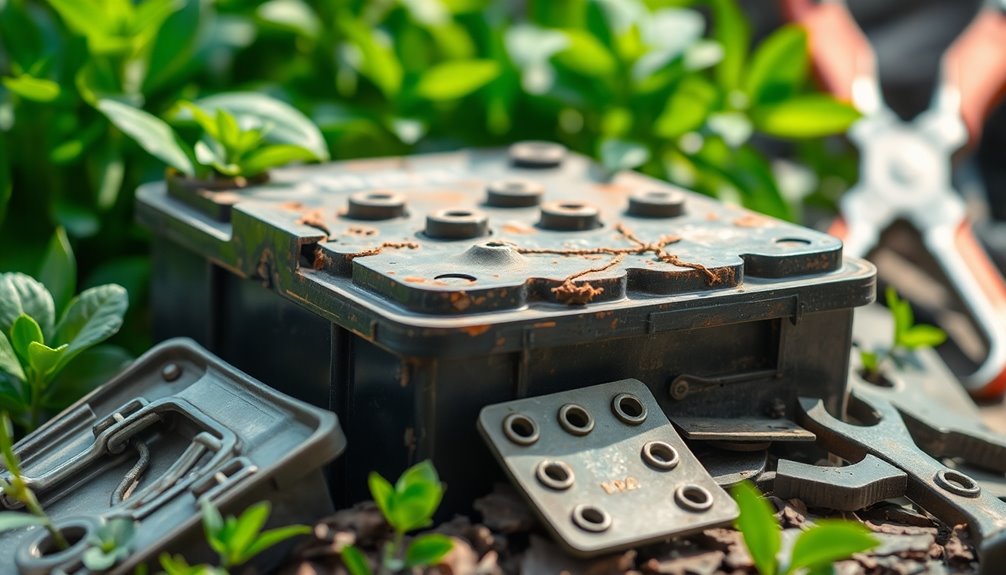
Re-purposing battery components not only reduces waste but also contributes to a sustainable environment.
By recycling old batteries, you're playing an essential role in the circular economy. Here's how these components can be effectively reused:
- Lead: Purified and reused in new batteries, guaranteeing sustainable production.
- Plastics: Processed into pellets for creating new products, cutting down on virgin plastic use.
- Sulfuric Acid: Neutralized into treated water or converted into sodium sulfate for laundry detergents.
- Reusable Materials: Safely managed to prevent environmental contamination.
The proper disposal of car batteries minimizes landfill waste while recovering valuable resources, benefiting both the environment and society.
Embracing these practices guarantees a cleaner, greener future for everyone.
Professional vs. DIY Recycling

While you might consider tackling battery recycling on your own, opting for professional services can greatly enhance safety and efficiency.
Professional recycling services guarantee the safe handling of hazardous materials like lead and sulfuric acid, considerably reducing health risks associated with improper disposal. DIY recycling can lead to accidents and potential legal penalties if you don't follow local regulations.
Professionals are trained to comply with these laws, providing peace of mind. Additionally, many recycling facilities offer cash incentives for returned batteries, making their services economically advantageous.
Sustainable Battery Alternatives
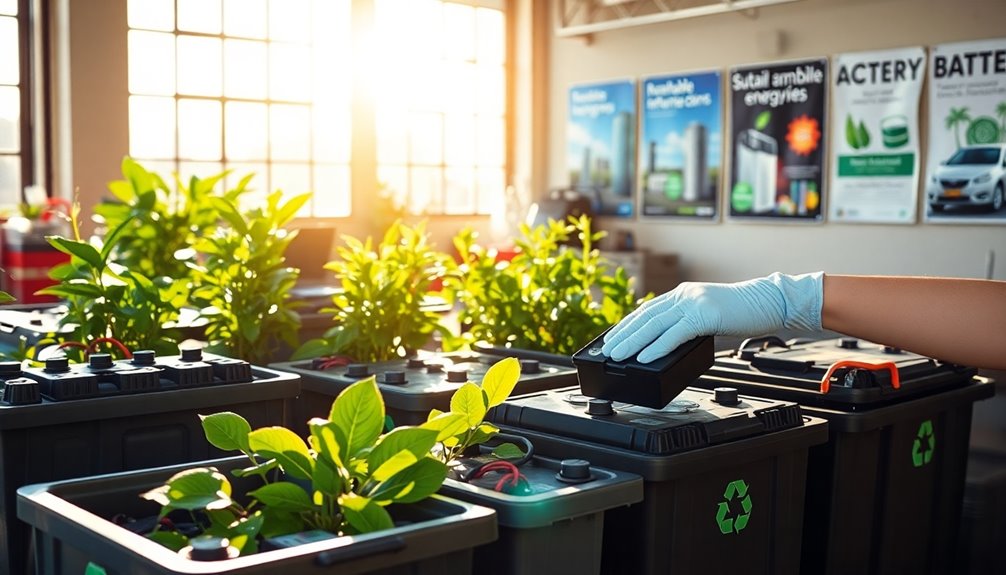
As you seek greener options for powering your devices, consider switching to rechargeable batteries, which offer a sustainable solution to the growing issue of battery waste.
These eco-friendly alternatives can provide over 1,000 charges, considerably reducing reliance on single-use batteries. By choosing rechargeable batteries, you're not only saving money but also contributing to resource recovery and a circular economy. Furthermore, adopting sustainable lifestyle changes can enhance your overall impact on the environment.
- Lower environmental impact
- Reduced battery waste
- Support for sustainable energy practices
- Cost-effective in the long run
Frequently Asked Questions
How Should a Car Battery Be Disposed Of?
When you're ready to dispose of a car battery, always take it to a certified recycling center or a local auto shop that handles battery recycling.
You should keep the battery upright, wear protective gloves, and transport it in a secure container to avoid leaks.
Check with large retailers, like Walmart or AutoZone, as they often accept old batteries and may even offer cash based on the battery's condition.
Follow local regulations for proper disposal.
How Much Can You Get for Recycling Car Batteries?
Like treasure hunters scouring for gold, you can find value in recycling your old car batteries.
Typically, you'll get around $5 to $10 per battery, depending on its condition and market demand. Some facilities even offer cash incentives, making it more rewarding.
Plus, if you return your old battery to certain retailers, you might score discounts on new purchases.
It's a win-win for both your wallet and the environment!
How Do I Dispose of Batteries in Wisconsin?
If you're looking to dispose of batteries in Wisconsin, you've got a few options.
Check for certified recycling centers at local auto parts stores or service shops, as they usually accept old batteries.
You can also look for designated hazardous waste collection days in your municipality.
Remember, state law requires lead-acid batteries to be recycled, so you can't just throw them away.
Some retailers even offer cash incentives for your old batteries!
Does Walmart Still Take Old Car Batteries?
Yes, Walmart still takes old car batteries!
If you've got one lying around, just swing by their Auto Care Centers or automotive departments. You might even snag a cash incentive or core charge refund when you drop it off while getting a new battery.
Just remember to call ahead and check your local store's policies. It's a quick way to help the environment and keep things rolling!
Conclusion
As you stand over that old car battery, imagine the potential lurking within it. By recycling or repurposing, you're not just disposing of waste; you're breathing new life into valuable resources and protecting our planet. Picture the transformation—your battery becoming part of something bigger, like a solar panel or a new electric vehicle. Don't let it end up in a landfill; take action now, and watch as your choice sparks a brighter, cleaner future.

